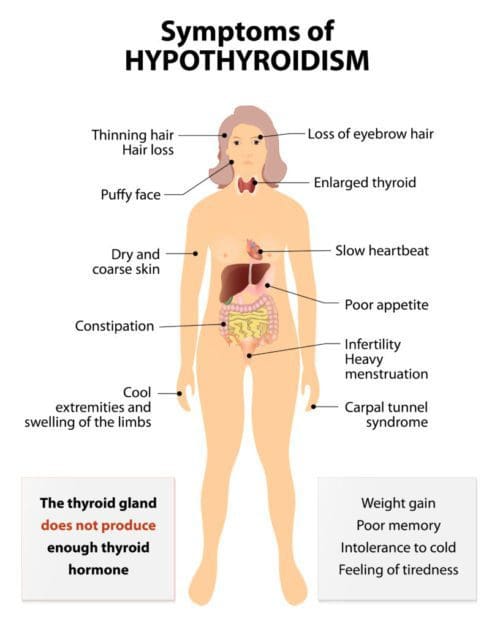According to the American Accreditation Organization, one in eight women will develop a thyroid disease during their life and as much as 60 percent of those with thyroid disease are unaware of their condition. Undiagnosed thyroid disease may put women at risk for certain acute conditions, such as cardiovascular diseases, infertility and obesity.
Table of Contents
What are the risks of thyroid disease on women?
Pregnant women with undiagnosed or inadequately treated hypothyroidism have an elevated risk of miscarriage, preterm delivery, and severe developmental problems in their children. The percentage of women who develop thyroid disease includes hyperthyroidism and thyroid cancer. Hypothyroidism, being the most common thyroid disorder.
What is Hypothyroidism?
Hypothyroidism is when your thyroid gland does not produce enough thyroid hormones. You may suspect you are hypothyroid. Or you may have an investigation. You may find out what to do about it besides taking drugs (thyroid replacement hormone). You might need drugs, but there are quite a few aspects of thyroid health to apply and to find out about. This is true for hypothyroid autoimmune disease, called Hashimoto’s thyroiditis.
To start with, what exactly are hypothyroid symptoms?

Other symptoms include:
- Depression
- Can’t conceive, or recurrent miscarriage
- Sluggish metabolism and constipation
- Other autoimmune problems: food intolerances (especially wheat), indigestion, bloating, gas
- Obsessive-compulsive thoughts
- Can’t lose weight with doing “all the Appropriate things”
- Brain fog, can’t think straight
- Skin rashes
- Frequently getting sick
- Muscle and joint pain
- Menstruation is heavy, can be irregular, can wipe out you
Common misdiagnoses include:
- Depression
- Stress
- Fibromyalgia
- Unexplained infertility
- Chronic Fatigue syndrome (CFS)
- “It is all in your head!”
Thyroid Hormones Simplified
Your thyroid gland produces a hormone called thyroxine (T4). In addition, it creates some triiodothyronine (T3). T3 is the hormone that your cells utilize. Organs, all cells and cells in your body that is whole utilize T3. Most of the T3 comes into T3. TSH stands for thyroid stimulating hormone. Your pituitary gland, in mind, secretes TSH when thyroid hormones are low. TSH signals your thyroid to put together raw materials, like iodine and tyrosine.
Conventional Hypothyroid Diagnosis and Treatment
Most licensed medical professionals can dictate thyroid labs. Conventional professionals usually only test TSH and T4. Usually it’s your symptoms that warrant the lab investigation. It may be your gynecologist, or your general practitioner, who first tests your thyroid. If it is favorable these professionals can opt to manage your condition, or they may refer you to an endocrinologist. It is always good to have an endocrinologist in your team, to assess your thyroid.
In case you really do have thyroid disease symptoms, your healthcare practitioner might first take a “watch and wait” approach. She’ll prescribe thyroid replacement hormone, if needed. This is the standard care of treatment. The hormone is generally a synthetic T4 (levothyroxin). This treatment assumes that you simply convert T4 to T3 with no problem.
Your healthcare practitioner typically won’t offer you much education about the type of hypothyroidism you’ve got, or what to do about it besides just taking thyroid hormone replacement. This is where functional medicine comes in.
A Functional Medication Approach on Hypothyroid
When women visit a doctor with a hypothyroid identification, they first need to learn if they have autoimmune hypothyroidism (Hashimoto’s). More than 80% of the time, patients don’t understand. This is because they have not been tested for it, or they haven’t been told. The very first thing I do is find out, by testing thyroid antibodies.
In conventional medicine, it doesn’t matter whether or not you have unexplained hypothyroid or Hashimoto’s, because the therapy is the same for both: tracking thyroid hormones, and prescribing hormone replacement. In functional medicine, hypothyroid that is unexplained is a totally different state than Hashimoto’s.
Unexplained hypothyroidism is often straightforward. Functional medicine practitioners try to find the root cause(s), then cure them. You might not have to take thyroid hormones for the rest of your life. Many women are able to repair hypothyroidism and avoid long-term thyroid replacement hormones.
Hashimoto’s rheumatoid arthritis requires a totally different strategy. It is important that you know you can take steps go into remission, and perhaps to slow down the development. Because in case you have one, your odds of developing more of them increases, you are able to prevent further autoimmune diseases.
After finding out which type of hypothyroidism which you have, it is imperative to find out what to do. Women do not understand their thyroid condition. That’s why it’s important to seek professional help as soon as possible.
The scope of our information is limited to chiropractic and spinal injuries and conditions. To discuss options on the subject matter, please feel free to ask Dr. Jimenez or contact us at 915-850-0900 . 
By Dr. Alex Jimenez
Additional Topics: Wellness
Overall health and wellness are essential towards maintaining the proper mental and physical balance in the body. From eating a balanced nutrition as well as exercising and participating in physical activities, to sleeping a healthy amount of time on a regular basis, following the best health and wellness tips can ultimately help maintain overall well-being. Eating plenty of fruits and vegetables can go a long way towards helping people become healthy.

TRENDING TOPIC: EXTRA EXTRA: About Chiropractic
Post Disclaimer
Professional Scope of Practice *
The information herein on "Prevalence of Hypothyroidism on Women | Wellness Clinic" is not intended to replace a one-on-one relationship with a qualified health care professional or licensed physician and is not medical advice. We encourage you to make healthcare decisions based on your research and partnership with a qualified healthcare professional.
Blog Information & Scope Discussions
Welcome to El Paso's Premier Wellness, Personal Injury Care Clinic & Wellness Blog, where Dr. Alex Jimenez, DC, FNP-C, a Multi-State board-certified Family Practice Nurse Practitioner (FNP-BC) and Chiropractor (DC), presents insights on how our multidisciplinary team is dedicated to holistic healing and personalized care. Our practice aligns with evidence-based treatment protocols inspired by integrative medicine principles, similar to those found on this site and our family practice-based chiromed.com site, focusing on restoring health naturally for patients of all ages.
Our areas of multidisciplinary practice include Wellness & Nutrition, Chronic Pain, Personal Injury, Auto Accident Care, Work Injuries, Back Injury, Low Back Pain, Neck Pain, Migraine Headaches, Sports Injuries, Severe Sciatica, Scoliosis, Complex Herniated Discs, Fibromyalgia, Chronic Pain, Complex Injuries, Stress Management, Functional Medicine Treatments, and in-scope care protocols.
Our information scope is multidisciplinary, focusing on musculoskeletal and physical medicine, wellness, contributing etiological viscerosomatic disturbances within clinical presentations, associated somato-visceral reflex clinical dynamics, subluxation complexes, sensitive health issues, and functional medicine articles, topics, and discussions.
We provide and present clinical collaboration with specialists from various disciplines. Each specialist is governed by their professional scope of practice and their jurisdiction of licensure. We use functional health & wellness protocols to treat and support care for musculoskeletal injuries or disorders.
Our videos, posts, topics, and insights address clinical matters and issues that are directly or indirectly related to our clinical scope of practice.
Our office has made a reasonable effort to provide supportive citations and has identified relevant research studies that support our posts. We provide copies of supporting research studies upon request to regulatory boards and the public.
We understand that we cover matters that require an additional explanation of how they may assist in a particular care plan or treatment protocol; therefore, to discuss the subject matter above further, please feel free to ask Dr. Alex Jimenez, DC, APRN, FNP-BC, or contact us at 915-850-0900.
We are here to help you and your family.
Blessings
Dr. Alex Jimenez DC, MSACP, APRN, FNP-BC*, CCST, IFMCP, CFMP, ATN
email: coach@elpasofunctionalmedicine.com
Multidisciplinary Licensing & Board Certifications:
Licensed as a Doctor of Chiropractic (DC) in Texas & New Mexico*
Texas DC License #: TX5807, Verified: TX5807
New Mexico DC License #: NM-DC2182, Verified: NM-DC2182
Multi-State Advanced Practice Registered Nurse (APRN*) in Texas & Multi-States
Multistate Compact APRN License by Endorsement (42 States)
Texas APRN License #: 1191402, Verified: 1191402 *
Florida APRN License #: 11043890, Verified: APRN11043890 *
License Verification Link: Nursys License Verifier
* Prescriptive Authority Authorized
ANCC FNP-BC: Board Certified Nurse Practitioner*
Compact Status: Multi-State License: Authorized to Practice in 40 States*
Graduate with Honors: ICHS: MSN-FNP (Family Nurse Practitioner Program)
Degree Granted. Master's in Family Practice MSN Diploma (Cum Laude)
Dr. Alex Jimenez, DC, APRN, FNP-BC*, CFMP, IFMCP, ATN, CCST
My Digital Business Card
RN: Registered Nurse
APRNP: Advanced Practice Registered Nurse
FNP: Family Practice Specialization
DC: Doctor of Chiropractic
CFMP: Certified Functional Medicine Provider
MSN-FNP: Master of Science in Family Practice Medicine
MSACP: Master of Science in Advanced Clinical Practice
IFMCP: Institute of Functional Medicine
CCST: Certified Chiropractic Spinal Trauma
ATN: Advanced Translational Neutrogenomics





 Again, We Welcome You.
Again, We Welcome You.
Comments are closed.